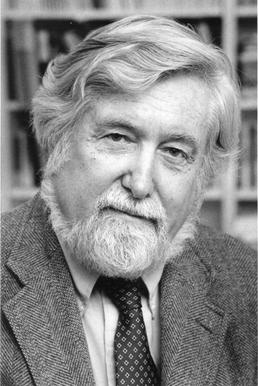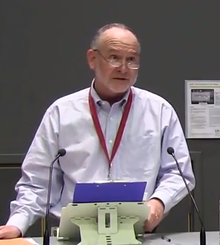
Clifford James Geertz was an American anthropologist who is remembered mostly for his strong support for and influence on the practice of symbolic anthropology and who was considered "for three decades... the single most influential cultural anthropologist in the United States." He served until his death as professor emeritus at the Institute for Advanced Study,Princeton.
Dorinne K. Kondo is a professor of American studies and Ethnicity and Anthropology at the University of Southern California. She is a scholar,playwright,and has over 20 years of work experience in dramaturge;her work shows the structural inequality of race and ethnicities in the world of contemporary theatre. Her creative performances are shedding light on racism and power in the theatre industry but her work mostly focuses on discrimination and racism towards Asians,which makes a link to art and politics. Kondo's writings discuss issues on power,gender inequality,the discourses in a Japanese workplace,and racism in the fashion industry. She is an activist against racism in America as she has openly discussed and teaches about racism and inequality of the sexes as she thinks that there is a chance for social transformation.
Political anthropology is the comparative study of politics in a broad range of historical,social,and cultural settings.

David W. Harvey is a British-born Marxist economic geographer,podcaster and Distinguished Professor of anthropology and geography at the Graduate Center of the City University of New York (CUNY),though he often claims to prefer the term Marxian. He received his PhD in geography from the University of Cambridge in 1961. Harvey has authored many books and essays that have been prominent in the development of modern geography as a discipline. He is a proponent of the idea of the right to the city.
Arturo Escobar is a Colombian-American anthropologist and Professor Emeritus of Anthropology at the University of North Carolina at Chapel Hill,USA. His academic research interests include political ecology,anthropology of development,social movements,anti-globalization movements,political ontology,and postdevelopment theory.
James L. Gelvin is an American scholar of Middle Eastern history. He has been a faculty member in the department of history at the University of California,Los Angeles (UCLA) since 1995 and has written extensively on the history of the modern Middle East,with particular emphasis on nationalism and the social and cultural history of the modern Middle East.
Saba Mahmood (1961–2018) was professor of anthropology at the University of California,Berkeley. At Berkeley,she was also affiliated with the Center for Middle Eastern Studies,Institute for South Asia Studies,and the Program in Critical Theory. Her scholarly work straddled debates in anthropology and political theory,with a focus on Muslim majority societies of the Middle East and South Asia. Mahmood made major theoretical contributions to rethinking the relationship between ethics and politics,religion and secularism,freedom and submission,and reason and embodiment. Influenced by the work of Talal Asad,she wrote on issues of gender,religious politics,secularism,and Muslim and non-Muslim relations in the Middle East.

Wendy L. Brown is an American political theorist. She is the UPS Foundation Professor in the School of Social Science at the Institute for Advanced Study in Princeton,NJ. Previously,she was Class of 1936 First Professor of Political Science and a core faculty member in The Program for Critical Theory at the University of California,Berkeley.
Tanya Marie Luhrmann is an American psychological anthropologist known for her studies of modern-day witches,charismatic Christians,and studies of how culture shapes psychotic,dissociative,and related experiences. She has also studied culture and morality,and the training of psychiatrists. She is Watkins University Professor in the Anthropology Department at Stanford University. Luhrmann was elected to the American Philosophical Society in 2022.

Joseph-Achille Mbembe,known as Achille Mbembe,is a Cameroonian historian,political theorist,and public intellectual who is a research professor in history and politics at the Wits Institute for Social and Economy Research at the University of the Witwatersrand. He is well known for his writings on colonialism and its consequences and is a leading figure in new wave French critical theory.
Postdevelopment theory holds that the whole concept and practice of development is a reflection of Western-Northern hegemony over the rest of the world. Postdevelopment thought arose in the 1980s out of criticisms voiced against development projects and development theory,which justified them.

James Clifford is an interdisciplinary scholar whose work combines perspectives from history,literature,history of science,and anthropology.
The Messenger Lectures are a series of talks given by scholars and public figures at Cornell University. They were founded in 1924 by a gift from Hiram Messenger of "a fund to provide a course of lectures on the Evolution of Civilization for the special purpose of raising the moral standard of our political,business,and social life",to be "delivered by the ablest non-resident lecturer or lecturers obtainable". The lecture series has been described as one of Cornell's most important of extracurricular activities.
The Anti-Politics Machine:Development,Depoliticization,and Bureaucratic Power in Lesotho is book by James Ferguson,originally published in 1990 by Cambridge University Press. The 1994 edition is available from the University of Minnesota Press. This book is a critique of the concept of "development" in general,viewed through the lens of failed attempts,specifically the Thaba-Tseka Development Project in Lesotho from 1975 to 1984. He writes about the countless "development agencies" that have their hand in the so-called "Third World" but points out the consistent failure of these agencies to bring about any sort of economic stability. This is what Ferguson calls the "development discourse fantasy",which arises from backward logic.

Akhil Gupta is an Indian-American anthropologist whose research focuses on the anthropology of the state,development,as well as on postcolonialism. He is currently a Professor of Anthropology at the University of California,Los Angeles. He is a former president of the American Anthropological Association.
The anthropology of development is a term applied to a body of anthropological work which views development from a critical perspective. The kind of issues addressed,and implications for the approach typically adopted can be gleaned from a list questions posed by Gow (1996). These questions involve anthropologists asking why,if a key development goal is to alleviate poverty,is poverty increasing? Why is there such a gap between plans and outcomes? Why are those working in development so willing to disregard history and the lessons it might offer? Why is development so externally driven rather than having an internal basis? In short,why is there such a lack of planned development?
Byron Joseph Good is an American medical anthropologist primarily studying mental illness. He is currently on the faculty of Harvard University,where he is Professor of Medical Anthropology at Harvard Medical School and Professor of Cultural Anthropology in the Department of Anthropology.

Henry D. Abelove is an American historian and literary critic,most of whose writings focus on the history of sex during the modern era. He is widely considered to be an important figure in the development of gay and lesbian studies and queer theory. He is best known for his groundbreaking books The Evangelist of Desire:John Wesley and the Methodists and Deep Gossip along with The Lesbian and Gay Studies Reader which codified the fields of gay and lesbian studies and queer theory and provided them with their first teaching anthology.
Marc Edelman is a professor of anthropology at Hunter College and the Graduate Center of the City University of New York. He was president of the American Ethnological Society from 2017 to 2019.
Marla Faye Frederick is an American ethnographer and scholar,with focus on African-American religious experience. She is currently the Asa Griggs Candler Professor of Religion and Culture at the Candler School of Theology at Emory University. Her work addresses a range of topics including race,gender,religion and media studies.







